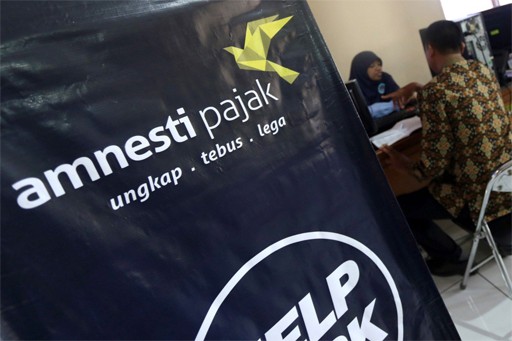Popular Reads
Top Results
Can't find what you're looking for?
View all search resultsPopular Reads
Top Results
Can't find what you're looking for?
View all search resultsHow to register and exchange tax info after amnesty
Change text size
Gift Premium Articles
to Anyone
S
ince the inception of the national tax amnesty program, the Automatic Exchange of Information (AEOI) has been mentioned by many parties as an instrument that can end global tax evasion. By having the AEOI mechanism in place, tax dodgers will no longer have a place to hide. That is the idea.
What is the AEOI actually? The Organization for Economic Co-operation and Development (OECD) describes the AEOI as a systematic and periodic transfer of taxpayers’ information from source countries to their residence countries. A source country is a country where a taxpayer receives income such as dividends, interest and others.
On the other side, residence countries are generally where individuals reside and in case of entities they are the places where they are incorporated.
For an example, let us say Mr. X receives US$1 million in dividends in country A, but Mr. X stays and resides in country B (he is a citizen of country B). Country A’s authority can send the AEOI concerning Mr. X’s financial information to country B.
Residence countries’ tax authorities then can analyze transmitted data in the AEOI and, if necessary, by utilizing the data they can undertake law enforcement activities to ensure that taxpayers have met their obligations properly.
Thus, the AEOI is a valuable instrument for worldwide tax authorities to capture non-compliance conduct, particularly that related to overseas transactions. The AEOI also may serve another function: It can deter “good taxpayers” from behaving fraudulently.
The rationale is straightforward: They should feel that the world is watching them all the time. All in all, by having a complete picture about “who owns what when and where”, tax compliance is expected to improve in the long run.
Last May, representatives and leaders of about 40 countries gathered in London to attend the 2016 international Anti-Corruption Summit. Interestingly, the summit was not all about corruption; it also touched on international taxation matters.
In the summit, David Cameron (the British prime minister at the time) said that his country would establish a publicly accessible beneficial owners (BO) register of companies in British territory.
In simple terms, BO means the persons who really own and/or benefit from companies. Some countries agreed to do so: Afghanistan, Kenya, France, the Netherlands and Nigeria (source: The Guardian).
Nonetheless, the United States was one of the countries that decided not to adopt the public BO register approach. Consequently, this has brought arguments from some summit participants.
According to The Economist, Allan Bell, the Isle of Man’s chief minister, said “it is all very well to pick on small jurisdictions, but it is the time to acknowledge the elephant in the room: USA. “As reported in The Cayman Compass, the Cayman Islands’ premier, Alden McLaughlin, commented that “any new agreement on a registry of who owns companies and trusts must be a truly global standard.” Bell’s and McLaughlin’s opinions are not groundless statements.
Back to 2009, in his speech on international tax policy reform, President Barack Obama pointed to the Ugland House, a five-story building situated in George Town, Cayman Islands, as “either the largest building in the world or the largest tax scam in the world”.
According to a US Government Accountability Office report in 2008, Ugland House’s sole occupant is Maples and Calder (an international law firm and company services provider), but Ugland House is also the registered office of 18,857 entities.
___________________
The AEOI is a valuable instrument for worldwide tax authorities to capture non-compliance conduct.
However, a yellow building on 1209 North Orange Street in Wilmington, Delaware, US, has been reported by The Guardian as the registered address of more than 285,000 companies.
This building contains 15 times more companies than the Ugland House. Based on information displayed on the State of Delaware’s official page, this address is the office of the Corporation Trust Company, which provides various services to companies.
Indonesian representatives who also attended the summit in London stated that Indonesia would be committed to explore the establishment of a public BO register and to implement the Common Reporting Standard, which serves as the basis of the AEOI.
The OECD reported on July 26 that there have been 101 countries that have committed to the AEOI, including Bermuda, the British Virgin Islands and the Cayman Islands.
Indonesia is among the first that will implement the AEOI by 2018. At this stage, it seems that Indonesia is having a strong commitment for the AEOI, but it is still considering its options regarding a public BO register.
Back to the AE0I issue, one of the most crucial dimensions in the AEOI is the information about the taxpayer or beneficial owner of a certain income. This is where a publicly accessible BO register could complement the analysis and usage of AEOI data.
If a residence country receives an AEOI, a global public BO register will significantly empower AEOI data by providing a more comprehensive picture of taxpayer profiles and their incomes in a more effective and timely manner (particularly for individual taxpayers).
Regardless of the potential benefits of a public BO register, international willingness and commitment to support a public BO register is still not totally moving in the same direction. Countries still have different attitudes in addressing this issue.
At the end of the day, through global cooperation in a public BO register and an AEOI, countries may receive valuable information to improve their domestic tax compliance, but they could also contribute to other nations. This could be a great assistance in tackling the global tax avoidance matter.
_______________________________
The writers are upstream analysts and international tax specialists at the Finance Ministry. The views written are their own.










